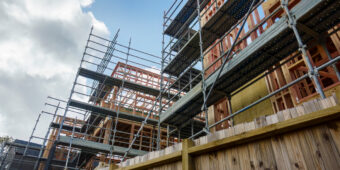IMPLIED WARRANTIES IMPLICATIONS
25 Nov 2021, Learn, Legal, Prove Your Know How

In a recent case, Palmer v Hewitt Building Limited & Anor [2021] NZHC 1460, the High Court clarified the application of statutory warranties contained in Part 4A of the Building Act 2004 (the Act). Duncan Cotterill reviews the role of these implied warranties in the residential building sector and what you need to be aware of
The High Court has clarified that the warranties contained in Part 4A of the Act apply only to the contracting party (usually a company) that is named in the relevant contract. Unless an individual builder is also a party to the contract, they will not be subject to the warranties.
A ‘building contractor’ for the warranties in Part 4A of the Act includes anyone building or selling household units. A ‘household unit’ is a building or buildings, or part of a building, that is intended to be used as a home or residence for one household. Accordingly, the implied warranties impose greater liability onto:
- Residential building contractors.
- House-building companies.
- Developers offering house-and-land packages.
- People who, for the purpose of on-sale, do any of the following:
- Build a household unit themselves.
- Arrange for a household unit to be built.
- Buy a household unit from someone who built it or arranged for it to be built.
In this article, the term ‘building contractor’ will be used to collectively apply to the above. The term ‘client’ in this article will refer to the client or purchaser named in the relevant contract and any subsequent purchaser of the household unit, who is covered by the implied warranties.
What is covered?
All residential building work is covered by the implied warranties in the Act for up to ten years.
There is no way to ‘contract out’ of these warranties. The warranties protect residential building work regardless of value or whether there is a written contract or not. They also transfer to subsequent purchasers, even if they were not a party to the original contract.
In summary, the warranties listed at section 362I of the Act are:
- The building work is carried out properly, in accordance with the plans and specifications in the contract and the building consent.
- Materials used are suitable for their purpose and new (unless otherwise stated in the contract).
- The building work complies with the Building Act, Building Code and all other legislation.
- The building work will be completed by the date specified in the contract (or, if no date is specified, within a reasonable time).
- The household unit is suitable for occupation on completion of the building work.
- The building work and any materials used are reasonably fit for the purpose stated.
What happens if there is a breach?
- 12-month defect repair period
The Act sets out what are considered ‘defects’. If there is any defect in the building work within twelve months of the building work being completed, the client can require the building contractor to remedy the defect.
During this twelve-month period, the client merely needs to claim a defect exists. If the building contractor disputes that there is a defect, then they bear the burden to prove this. In effect, the Act imposes a mandatory defects liability period of twelve months in all residential building contracts.
- Outside the 12-month defect repair period
After the initial twelve-month period, the burden of proof shifts to the client to prove that the building contractor is responsible for any disputed defect in the building work. The building contractor remains liable for any breach of the statutory warranties for ten years.
- Dispute resolution process
Where there is a dispute about whether a warranty or warranties are breached, the dispute resolution process set out in the contract (if any) should be followed first. If the contract does not contain a dispute resolution process, or there is no written contract, then the default clauses in the Act will apply.
The Construction Contracts Act 2002 also provides an adjudication process for disputes under contracts for construction work.
- Remedies
Section 362M to 362P of the Act sets out the potential remedies for a breach of an implied warranty. A breach of the implied warranties is a breach of the contract.
Once a defect becomes known, the client must raise the issue with the building contractor and, if the issue cannot be resolved between the parties, the client must make a legal claim within six years from the date of the breach.
a) Where the breach can be remedied:
- The client may require the building contractor to remedy the breach, including replacing defective materials.
- If the building contractor does not remedy the breach within a reasonable time, the client may have the breach remedied by someone else and recover the reasonable costs for having done so from the building contractor, or they may cancel the contract.
- In addition to the above options, the client may seek damages from the building contractor for any reasonably foreseeable loss or damage resulting from the breach.
b) If the breach cannot be remedied:
- The client may seek damages for any loss of value to the household unit; or
- Cancel the contract.
- In addition to the above options, the client may seek damages from the building contractor for any reasonably foreseeable loss or damage resulting from the breach.
Recommendations
To mitigate their risk, we recommend that building contractors:
- Ensure their contracts include clauses that:
- Deal with any materials which are not new or are to be recycled.
- Determine when building work will be considered complete and the twelve-month defect remedy period starts.
- Obtain written consent from the client and the relevant council (if required) of any changes to materials from what was specified in the plans and building consent.
- Provide the client with details of any maintenance requirements for the building work – this will assist in excluding liability where the building work isn’t maintained properly.
- Ensure their contracts with any subcontractors include clauses that:
- Require subcontractors to perform their work to the correct standard.
- Enable claims to be made against the subcontractor if their actions have breached the implied warranties.
- Keep all documentation, including copies of the contract, for at least the ten-year period.
- Check that their insurance policies cover the implied warranties.
- Account for this potential liability when structuring their business.
- Don’t attempt to contract out of the implied warranties or advise clients that they don’t apply as this will be a breach of the Fair Trading Act.
If you have any questions about implied warranties or would like assistance, please contact Alysha Hinton on (04) 471 9452 or at alysha.hinton@duncancotterill.com, or your local Duncan Cotterill advisor (duncancotterill.com). Duncan Cotterill is a full-service law firm with offices in Auckland, Wellington, Nelson, Queenstown and Christchurch.
Disclaimer: the content of this article is general in nature and not intended as a substitute for specific professional advice on any matter and should not be relied upon for that purpose.
Register to earn LBP Points Sign in
1 Comment
Leave a Reply
You must be logged in to post a comment.




done